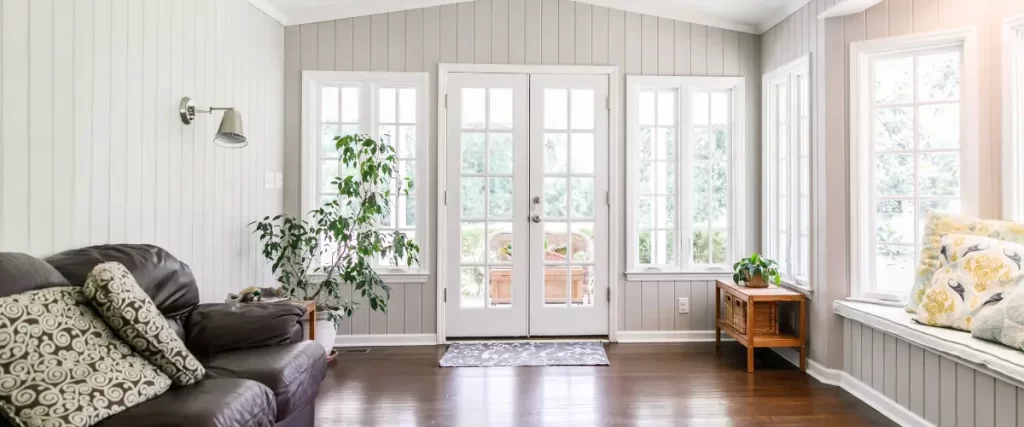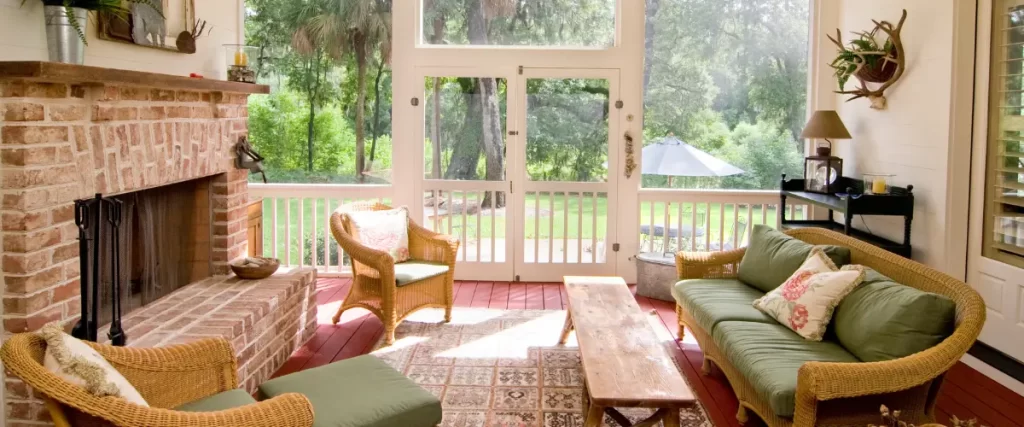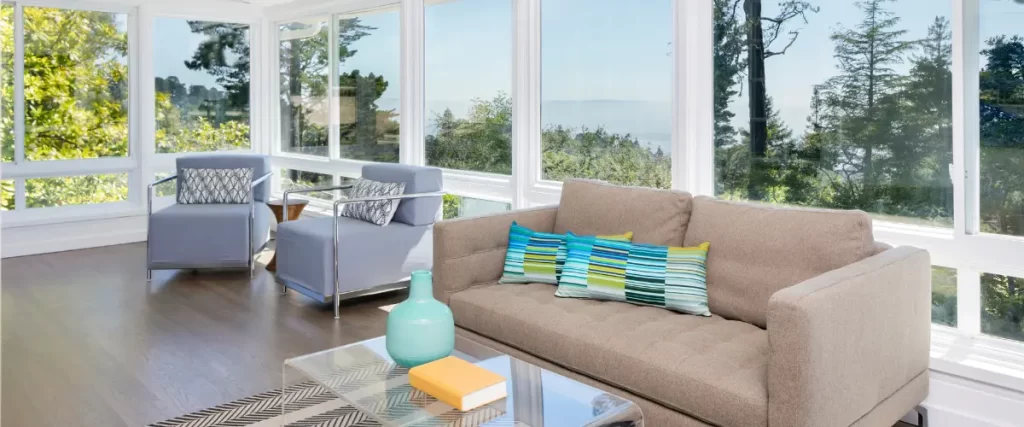If you’ve ever tried to enjoy your morning coffee on the porch in April, only to find your patio furniture coated in that infamous yellow dust, you’re not alone. North Carolina’s pollen season is as relentless as it is beautiful.
From the Piedmont to the Coastal Plain, spring paints our landscapes in vibrant colors, then promptly dumps a thick layer of sneeze-inducing pollen all over everything.
But what if you didn’t have to choose between fresh air and clean lungs? What if there were a way to embrace the beauty of spring without the allergies, mess, and maintenance? That’s where a sunroom comes in.
If you’re a North Carolina homeowner looking for a practical (and pretty) solution to pollen season, stick with me. You’re about to learn how a sunroom can be your new favorite room in the house, especially when the pine trees start shaking loose.

Why Is Pollen So Bad in North Carolina?
Before we get into the perks of a sunroom, let’s talk about the enemy: pollen.
North Carolina is a pollen powerhouse. Thanks to our long growing seasons, diverse flora, and mild climate, we get hit hard—especially in spring. March through May brings a cocktail of pollen types:
Pine pollen (that thick yellow stuff)
Oak pollen (super fine and sticky)
Maple, birch, and other hardwoods
Grass pollen (yep, that joins in too around late spring)
The North Carolina Department of Environmental Quality (NCDEQ) regularly tracks pollen counts, and they often spike well into the “very high” range by April. You can even check daily forecasts here.
For allergy sufferers, this means months of itchy eyes, runny noses, and sinus pressure. For everyone else, it’s wiping down furniture daily, not opening the windows, and trying to enjoy the outdoors while feeling like you’re walking through a pollen cloud.
What Is a Sunroom, and Why Should You Care?
In simple terms, a sunroom is an enclosed space, usually surrounded by large windows or glass panels, that lets you enjoy the sunlight and outdoor views without being exposed to the elements.
There are different types of sunrooms, but they all share one magical feature: they keep pollen out.
Whether you want to use your sunroom as a reading nook, a casual dining area, a playroom for the kids, or your personal yoga studio—you’re doing it with a front-row seat to nature and climate control.
How a Sunroom Protects You During Pollen Season
Here’s how a sunroom can dramatically improve your spring lifestyle in North Carolina:
1. Pollen-Free Comfort
Sunrooms are enclosed and sealed, which means pollen stays outside where it belongs. While your neighbors are constantly wiping down their porch swings, you can kick back with a good book or watch the birds without needing a box of tissues nearby.
2. Improved Indoor Air Quality
With options to install air purifiers, ceiling fans, or even HVAC connections, your sunroom can be a haven of clean, filtered air. That’s especially important during peak allergy months.
3. Extended Outdoor Enjoyment
Because you’re protected from pollen, bugs, wind, and rain, you get more days to enjoy the “outdoor” feeling. Spring in NC is beautiful, but spring storms and airborne allergens can make it hard to fully enjoy. A sunroom gives you the best of both worlds.
4. Less Cleaning and Maintenance
Let’s be real: wiping down furniture every day gets old fast. A sunroom protects your furniture and floors from pollen buildup, so you spend less time cleaning and more time relaxing.
5. Increased Home Value
Sunrooms are one of the most desirable upgrades for NC homeowners. According to Remodeling Magazine, sunroom additions offer a solid return on investment. Plus, they’re a great way to make your home more marketable when it’s time to sell.
Types of Sunrooms That Work Best in North Carolina
Depending on your budget and goals, you have a few sunroom styles to consider. Here’s a quick breakdown:
A three-season sunroom is ideal for enjoying mild spring, summer, and fall weather. With light insulation and no connection to your home’s HVAC system, it is a more affordable and quicker option to install. However, this type of sunroom may become too cold in the winter or too hot during peak summer months.
On the other hand, a four-season sunroom is designed for year-round use, featuring high-performance glass and framing with the option to connect to your home’s HVAC system. While this option provides comfortable, energy-efficient use in any weather, it does come with a higher initial cost.
Screen Room (Bonus Mention)
Not technically a sunroom, but worth mentioning. It’s a screened-in porch—great in mild months, but not pollen-proof.

Location-Specific Considerations for NC Homeowners
Every region in NC has its own quirks when it comes to building a sunroom:
In coastal areas like Wilmington and the Outer Banks, the salty air means you’ll need corrosion-resistant materials, such as aluminum or vinyl frames, and it’s essential to account for permits and hurricane resistance by checking with your county’s building department.
In the Piedmont region, including cities like Raleigh, Greensboro, and Charlotte, the climate makes it perfect for four-season sunrooms, but you’ll need to be mindful of HOA guidelines in suburban neighborhoods.
Meanwhile, in the mountains around Asheville and Boone, factors like snow loads, elevation, and colder temperatures require a well-insulated four-season sunroom, with south-facing designs being ideal to maximize sunlight during shorter winter days.
Top Sunroom Manufacturers You Should Know
Choosing the right manufacturer ensures your sunroom stands up to North Carolina’s pollen, humidity, and weather swings.
Trusted Manufacturers for Quality Sunrooms
We’ve listed the most reputable brands known for quality, durability, and weather performance in North Carolina.
Four Seasons Sunrooms
Long-standing reputation for insulated glass systems and customizable designs.
TEMO Sunrooms
Known for maintenance-free aluminum framing and durable roof panels.
Patio Enclosures by Great Day Improvements
Offers versatile styles, including floor-to-ceiling glass options.
Champion Windows & Home Exteriors
High-performance glass and customizable features designed for all-season comfort.
Eze-Breeze (P.T. Mulligan Products)
Popular in coastal and Southern areas for their flexible 3-season room systems.
How to Maintain a Sunroom During Pollen Season
Even though it keeps the pollen out, your sunroom still needs some TLC:
Vacuum window sills weekly to keep stray pollen and dust at bay.
Wipe down glass with microfiber cloths—avoid ammonia cleaners if you have UV-coated glass.
Change HVAC or air purifier filters more often in spring.
Use doormats and no-shoe policies to prevent pollen from being tracked in.
Frequently Asked Questions
Do sunrooms really block all pollen?
A well-sealed sunroom with enclosed windows and doors keeps out most pollen. Air filtration can make it even cleaner.
Is a permit required to build a sunroom in North Carolina?
Yes, most counties require permits. Check with your local building office or visit the NC Department of Insurance – Building Codes.
Can I use a sunroom year-round in North Carolina?
Absolutely, especially with a four-season sunroom. With proper insulation and HVAC, it’s comfortable 12 months a year.
How long does it take to install a sunroom?
Depending on the style and scope, it can take anywhere from a few weeks to a couple of months.
Is a sunroom better than a screened porch during pollen season?
Yes. Screened porches let pollen in. Sunrooms offer full protection with the same open feel.

Final Thoughts: Make Pollen Season Your Favorite Season
North Carolina spring is too gorgeous to spend it cooped up indoors or constantly wiping down your porch furniture. A sunroom lets you have the best of both worlds: the beauty of spring and the comfort of being protected from pollen.
Imagine sipping coffee while watching cardinals fly by—no sneezing, no mess, just peace.
If you’re ready to transform your home with a sunroom and enjoy spring the way it was meant to be enjoyed, contact us at (919) 308-1515. We’d love to help you create a space that brings the outdoors in—minus the pollen.
